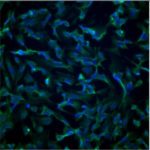Link to Pubmed [PMID] – 29959201
Mol. Cancer Ther. 2018 Sep;17(9):1881-1892
The identification of new therapeutic strategies against osteosarcoma, the most common primary bone tumor, continues to be a primary goal to improve the outcomes of patients refractory to conventional chemotherapy. Osteosarcoma originates from the transformation of mesenchymal stem cells (MSC) and/or osteoblast progenitors, and the loss of differentiation is a common biological osteosarcoma feature, which has strong significance in predicting tumor aggressiveness. Thus, restoring differentiation through epigenetic reprogramming is potentially exploitable for therapeutic benefits. Here, we demonstrated that the novel nonnucleoside DNMT inhibitor (DNMTi) MC3343 affected tumor proliferation by blocking osteosarcoma cells in G or G-M phases and induced osteoblastic differentiation through the specific reexpression of genes regulating this physiologic process. Although MC3343 has a similar antiproliferative effect as 5azadC, the conventional FDA-approved nucleoside inhibitor of DNA methylation, its effects on cell differentiation are distinct. Induction of the mature osteoblast phenotype coupled with a sustained cytostatic response was also confirmed when MC3343 was used against a patient-derived xenograft (PDX). In addition, MC3343 displayed synergistic effects with doxorubicin and cisplatin (CDDP), two major chemotherapeutic agents used to treat osteosarcoma. Specifically, MC3343 increased stable doxorubicin bonds to DNA, and combined treatment resulted in sustained DNA damage and increased cell death. Overall, this nonnucleoside DNMTi is an effective novel agent and is thus a potential therapeutic option for patients with osteosarcoma who respond poorly to preadjuvant chemotherapy. .

